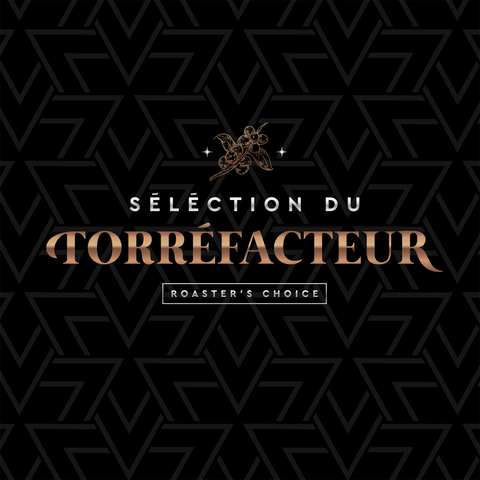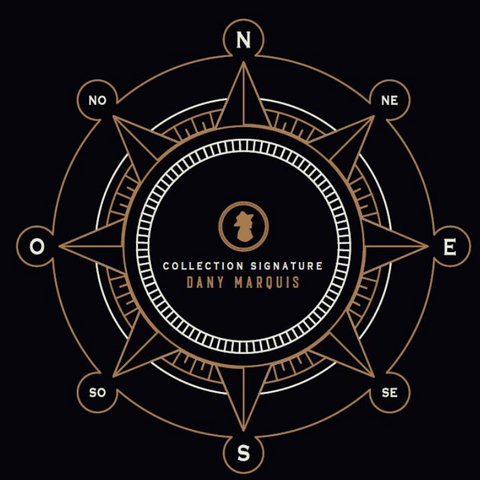
Hello everybody,
It is with immense joy that we inform you that the “ SELECTION OF THE ROASTER ” adventure can begin.
The first shipment of new coffees has arrived and ready to roast. We can therefore draw up a list of the 2 monthly coffees which will be sent over the next three months to subscribers to the ROASTER'S SELECTION.
What is ROASTER SELECTION?
This is our new monthly subscription offer.
You probably already know that most of our coffees are available on a monthly subscription basis: if you have a blend or batch that you like, subscribe to that product to receive it automatically every month.
This new other subscription offer takes the form of a “Surprise Box”: PER MONTH you will receive two (2) bags between 200g and 400g (depending on the quality of the grain): subscribers will therefore discover two (2 ) varieties/terroirs per month , 24 exceptional coffees/terroirs per year.
Above all, it is important to remember that the coffees that we purchased specially to compose this “ Roaster Selection ” product will not be available all year round. We have only ordered very limited quantities of each of these local coffees: we will even have to set a limit on the number of subscribers (depending on available stock and the number of interested parties).
The coffees specially imported to make up this offer will not be available anywhere else in the store. These coffees are non-collection, “transient” batches, tasting samples which will not be available all year round. These coffees imported in super-mega-micro-lots will not be available as a single purchase, only as a monthly subscription plan. Go to the product description sheet - soberly called Roaster's Selection - to subscribe to this box.
The approach behind this surprise box SELECTION OF THE ROASTER
The idea behind the project is quite simply: EXPLORATION. Here is a sort of invitation that we are extending to you, an invitation to explore the tastes and aromas of coffee.
Our roaster wants to taste as many gourmet coffees as possible, before the end of the world. You have the chance to participate in this trip by obtaining your share of the samples (we only buy a few dozen kilos per variety and terroir) .
Every quarter, a calendar of “explorations” will be published: calendar of the 6 coffees that we plan to ship for the next 3 months. Follow our blog or subscribe to our newsletter to be informed of announcements.
List of first quarter cafes
Here is the list of the first 6 coffees (as well as their respective detailed files) which will be sent over the next three months. Another list will come out in 3 months.
July 2019
1- Colombia Bruselas Salomon Artunduaga
Plantation : Finca Futura (10ha family farm)
Territory : Bruselas, Pitalito, Huila, Colombia
Altitude : 1670 m
Post-harvest treatment : fully washed, parabolic dried
Botanical variety : Castillo, Caturra
Harvest: December 2018 - January 2019
Flavors : chocolate, brown sugar, wine, pear, cherry, grape, maple syrup
First sample from our “Roaster Selection” offer, this coffee comes from the December 2018 – January 2019 harvest from the family plantation called “Finca Futura”, located in Bruselas, Huila region, in Colombia and managed for 30 years by Salomon Artunduaga .
This batch is mainly composed of Castillo botanical variety beans, mixed with a little Caturra. As a reminder, Castillo is a variety created in the mid-1980s in Colombia - by crossing Caturra and Hybride du Timor - specifically to better resist rust and other diseases such as anthracnose. Caturra is a variety that derives from Bourbon and is popular in Latin and Central America.
Colombia Bruselas Salomon Artunduaga coffee is added to our long list of fully washed coffee: washed coffee, depulped, fermented for 36 hours and sun dried. Its particularity lies in the fact that the African beds used for drying are housed in a sort of greenhouse (wooden structure and natural fiber or plastic tarpaulin). “Parabolic Dried” is another, more specific name for this type of coffee.
The complex aromatic profile of this Colombian coffee is sure to please fans of gourmet coffee (specialty coffee): the final taste in the cup contains lots of aromas of chocolate and brown sugar, a slight acidity, subtle floral and fruity notes (pear, cherry, melon), all in a syrupy texture perfect for espressos.
2- Guatemala San Pedro Necta Palhu
Plantation: Finca La Providencia managed by Maximiliano Palacios
Territory: San Pedro Necta, Huehuetenango, Guatemala
Altitude: 1550 m
Post-harvest treatment : pulped, fermented, washed, dried in the sun - on patios and in a machine
Botanical variety : Bourbon, Catuaí, Caturra, Mundo Novo
Harvest : October 2018 - February 2019
Aromas : caramel, brown sugar, plum, chocolate, honey, slight citric acidity, sweet floral notes, velvety texture
Who wants to taste Guatemalan coffee? La Brûlerie du Quai got its hands on a batch from a very famous terroir in Guatemala: this is the Huehuetenango region, also called “Huehue”.
The farm from which this lot comes is located in the municipality of San Pedro Necta, at an altitude of 1550 m: it bears the sweet name of Finca La Providencia and is managed by Maximiliano Palacios (3rd generation of coffee farmers).
The name Palhu comes from the contraction of Palacios and “Huehue”. The coffee at Finca La Providencia stands out from all Guatemalan coffees. The reason being that it is a unique blend of several varieties that they grow on site: the proportions, the grain processing techniques, etc.: everything is carefully studied to give a unique aromatic profile which becomes the signature of the farm, Palhu's signature.
This famous signature of Palhu, which is a pronounced sweet taste and a complex and very rich aromatic profile, results in part from the choice of treatment of the bean, which is depulped, fermented, washed, dried in the sun - on patios and carefully in a mechanical dryer. The machine used to dry the grains is a Guatemalan invention, called guardiola .
The botanical varieties blended to produce this Guatemala San Pedro Necta Palhu coffee – that is to say Bourbon, Catuaí, Caturra and Mundo Novo – have been processed to produce a coffee with a very velvety – even smooth – texture that fills the mouth with comforting aromas of lightly salted caramel.
This coffee is just perfect both as an espresso and as a V60.
August 2019
1- Honduras El Pelón Cristina Lara
Territory : El Pelón, San Juan, Intibucá, Honduras
Altitude : 1350 m
Post-harvest treatment : pulped, fermented, washed, sun-dried
Botanical variety : Catuaí, IHCAFE90, Lempira
Harvest : December 2018 - March 2019
Flavors : plum, pear, apple, figs, cherry, praline, mandarin or white grape
One of our favorite suppliers is Doña Cristina, a reference in Honduran coffee. Cristina Lara manages a family farm of approximately 5ha located in the municipality of El Pelón, in the department of Intibucá, Honduras.
Fully washed and dried in the sun, Honduras El Pelón Cristina Lara coffee is mainly aimed at people who are looking for fruity notes and a very present but “balanced” acidity. In your cup, you will find tastes of plum, pear, apple, figs, cherry, aromas of candied, praline, a light acidity reminiscent of mandarin or white grapes.
Thanks to a pleasant syrupy texture, this coffee is very easy to drink and is ideal for “gourmet” coffee breaks, with a small pastry or at brunch. The beans are mainly of the Catuaí botanical variety, mixed with Lempira and IHCAFE90 beans (these are two Catimor sub-varieties (crossing Caturra + Timor Hybrid) which grew and mutated on Honduran soil).
2 - Mexico Women of Bella Vista
Plantations : nearly 50 farms run by “the women of Bella Vista”
Terroir : La Rinconada, El Progreso, Unión Progreso and Barrio Montaña communities of Bella Vista, Chiapas, Mexico.
Botanical varieties : Bourbon, Catimor, Caturra, Marigogipe, Mundo Novo
Harvest : December 2018 - March 2019
Altitude : 1550 - 1650 m
Post-harvest treatment : pulped, fermented, washed, sun-dried
Flavors : caramel, cocoa, honey, peach, plum, apple, lemon, brown sugar
And here is this quarter's favorite: coffee grown and processed by the women of Bella Vista, Mexico. This coffee is a must-try not only for its unique flavor profile, but also for the social cause it represents.
We strongly support Rosalba Cifuentes ' initiative to promote and encourage the work of women in the coffee sector in Mexico. The project came to life in Bella Vista, in the Chiapas region, Mexico, through the Mayan Harvest Coffee export company established by Rosalba Cifuentes.
It consists of focusing on coffee grown by women in the region: a total of nearly 50 women participate in the project , growing coffee on their family plantations of an area of 2 - 4 ha at most.
Mayan Harvest aims to establish fair trade for these 50 women and their carefully produced coffees. Social support programs are also put in place to improve the living conditions of women farmers.
Also, Rosalba Cifuentes' initiative aims to promote Mexican coffee, removing its status as an entry-level coffee that we buy for blends. Mexico indeed has exceptional terroirs which can provide specialty coffee.
In addition to this social action for the promotion of women's work , this Mexico Women coffee from Bella Vista is also a favorite for its very interesting aromatic profile. The quality of the beans is optimal, we really appreciate its floral notes (jasmine for example) and its complex taste. With a juicy texture that is accompanied by a flavor of caramel and chocolate mousse when prepared as an espresso, this coffee presents pleasant fruity notes to start the day: peach, plum, apple, lemon, cane sugar...
We owe this unique aromatic profile to, among other things, the atypical blend of grains from several different botanical varieties: Bourbon, Catimor, Caturra, Marigogipe, Mundo Novo. The processing of these grains after harvest was done using the fully washed method: pulped, fermented, washed and dried in the sun.
September 2019
1- Uganda Kapchorwa Sipi Falls
Plantations : family farms around the Sipi Falls washing station
Territory : Kapchorwa District, Eastern Uganda
Botanical varieties : Blue Mountain Typica, Bourbon, Bugisu, SL14, SL28
Harvest : September 2018 – February 2019
Altitude : 1100 - 1900 m
Post-harvest treatment : fully washed coffee (depulped, fermented, washed, dried in the sun on African beds)
Flavors : pear, grape, peach, apricot, molasses, brown sugar, butterscotch, nuts, vanilla, cherry, lime, bubble gum, nougat
Uganda Kapchorwa Sipi Falls is not an ordinary “weekday” coffee that you drink to wake up well: this coffee is a dessert that is savored. It is in fact a coffee whose entire interest lies in its sweet notes and its tropical fruit tastes, a light roasting is therefore essential to extract them correctly.
The beans that make up this microlot come from family farms located in the Bugisu region, on the northern flank of Mount Elgon, Kapchorwa district, Uganda .
Sipi Falls is the name given to three waterfalls found in Mount Elgon National Park. As part of a project aimed at optimizing the quality and reputation of Ugandan Arabica coffee and sustainably improving the quality of life of those who grow it, a support program for farmers in the region has been in place since 1999. .
Among other things, he was responsible for the installation of a major washing station on site in Sipi Falls. Managed by the export company Kawacom, the station is also equipped with modern pulping and drying machines as well as expert coffee agronomists who supervise the procedures to control the quality of the beans.
This lot is a blend of beans from several different botanical varieties that are grown on site: Blue Mountain Typica, Bourbon, Bugisu, SL14, SL28 . The uniqueness of this coffee lies, among other things, in the presence of the “Bugisi” variety in the blend: it is a local variety which was created through the mutations of other cultivars, mutations mainly influenced by the The exceptional microclimate of Mount Elgon National Park.
In a cup, Uganda Kapchorwa Sipi Falls coffee has a juicy texture both in espresso and V60 and offers an explosion of fruity tastes: pear, peach, mandarin, apricot, vanilla . Acidic notes of cherry, lime, white grape, cranberry and plum add to these tropical fruit tastes. The special touch of this gourmet coffee remains its sweet aromas… of cotton candy, bubble gum, nougat, caramel, cocoa: this is what gives it this aromatic profile of “dessert coffee”.
2- Sumatran Junus Family
Plantation : Junus Family farm and small plantations sharing the Jagong Jeget washing station
Territory : Bukit Harapan, Jagong Jeget, Aceh, Sumatra, Indonesia
Post-harvest treatment : fully washed coffee (depulped, fermented for 12 hours, washed and partially dried in the sun (wet hulling / Giling Basah)
Botanical varieties : Ateng, Tim-tim
Harvest : October – December 2018
Altitude : 1350 - 1600 m
Flavors : apple, mango, cherry, dried cranberry, pineapple, tomato, brown sugar, milk chocolate
Many were impatiently awaiting this news: a new coffee from Asia has finally expanded our collection. It comes to us from Sumatra, one of the most popular Indonesian terroirs.
The exact terroir is a locality called Bukit Harapan, in the Aceh region, Sumatra, Indonesia . All the coffee activity that interests us here takes place in the vicinity of the Jagong Jeget washing station , run by the family of Irham Junus.
Nearly 400 families of coffee growers are based in this locality and benefit from the contributions of the Red Cherry project, which aims to constantly raise the level of quality of the beans and establish fair and sustainable trade.
The grains grown in this region of Aceh and used to give this mixture called “ Sumatra Junus Family ” are of two organic varieties: Ateng, Tim-tim (which are respectively the common local names for the Timor Hybrid and Catimor varieties grown on site) . This combination of varieties is common in other countries, we can therefore envisage that the particularity of the aromatic profile of this coffee comes largely from the specificities of the terroir and the climate.
Another very influential detail about the unique Sumatran coffee aroma lies in an applied post-harvest processing technique: this is the famous Wet Hulling Process or “Giling Basah” in the language of the country. The French translation would be “hulling or peeling in a (semi-)humid state”. The very characteristic color and base note of Sumatran coffees come from this processing stage.
The process is a variation of the traditional fully washed method, except that instead of drying in the sun until the desired final humidity is 11% (after pulping, fermentation for 12 hours and washing), the Farmers interrupt it at between 20-45% humidity, creating an additional stage of semi-drying or pre-drying. They choose to hull the grains (i.e. mechanically remove the parchment that remains around the grain) at this stage of its drying, before putting them back to dry in the sun until they reach the ideal humidity threshold, at around 11%. This is among other things why your cup of this Sumatran coffee will have an almost bluish color and an earthy aroma.
Certified organic coffee and processing only red and ripe cherries, the Sumatra Junus Family microlot also benefits from the certified “triple picked” designation, reserved for beans sorted by hand according to very strict standards. The final taste of the coffee is rich in fruity aromas: apple, mango, cherry, dried cranberry, pineapple and even tomato. Everything is accompanied by a base note of brown sugar and milk chocolate, without forgetting a slight citric acidity which tickles the palate.




Comments (0)
There are no comments for this article. Be the first one to leave a message!